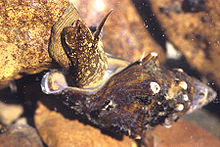Pleuroceridae, common name pleurocerids, is a family of small to medium-sized freshwater snails, aquatic gilled gastropod mollusks in the superfamily Cerithioidea.These snails have an operculum and typically a robust high-spired shell.
| Pleuroceridae | |
|---|---|

| |
| Io fluvialis | |

| |
| Athearnia anthonyi | |
| Scientific classification | |
| Domain: | Eukaryota |
| Kingdom: | Animalia |
| Phylum: | Mollusca |
| Class: | Gastropoda |
| Subclass: | Caenogastropoda |
| Superfamily: | Cerithioidea |
| Family: | Pleuroceridae Fischer, 1885 |
| Diversity[1][2] | |
| About 150 extant species | |
Reproduction is iteroparous, and juvenile snails emerge from eggs laid on a firm surface by a gonochoristic female. There is no veliger stage.
Evolution
editThere is very high level of mitochondrial heterogeneity in apparent species of Pleuroceridae (highest among gastropods, also with Semisulcospiridae), that has not been sufficiently explained yet as of 2015.[3] However, it has been suggested that this may be due to pleurocerids having very poor dispersal abilities, allowing even slightly separated populations to see great genetic divergence.[4]
Populations of the pleurocerid species in the Old Appalachians (Virginia south to Georgia) are present on both sides of the Eastern Continental Divide, but there is no difference in the extent of intrapopulation heterogeneity on either side, and there is no evidence for cryptic speciation on either side either. Given the age of the Appalachians, it has been suggested that these populations may be extremely ancient, dating back to the Paleozoic when the initial Appalachian orogeny separated them, to the extent that any geographic signal in the test gene for the divergence estimates has been lost. Levels of genetic divergence appear to be lower in the modern center for pleurocerid diversity (the Alabama and Coosa river systems) than in the Old Appalachians, indicating that the latter may represent the ancestral origin of pleurocerids.[4]
Distribution
editAs currently defined, this family is confined entirely to eastern North American fresh waters. Similar snails formerly classified with Pleuroceridae, but now assigned to other families are widespread in temperate and tropical parts of Southern and Eastern Asia,[citation needed] and Africa.[citation needed] Most require unpolluted rivers and streams, but a few are adapted to living in lakes or reservoirs.
Taxonomy
edit2005 taxonomy
editThe following two subfamilies have been recognized in the taxonomy of Bouchet & Rocroi (2005):[5]
- Pleurocerinae P. Fischer, 1885 - synonyms: Ceriphasiinae Gill, 1863; Strepomatidae Haldeman, 1864; Ellipstomatidae Hannibal, 1912; Gyrotominae Hannibal, 1912; Anaplocamidae Dall, 1921
- Semisulcospirinae Morrison, 1952 - synonym: Jugidae Starobogatov, Prozorova, Bogatov & Sayenko, 2004 (n.a.)
2009 taxonomy
editSubfamily Semisulcospirinae within Pleuroceridae was elevated to family level Semisulcospiridae by Strong & Köhler (2009).[6]
Genera
editGenera within the family Pleuroceridae are organized in the one subfamily only since 2009 and they include:
Pleurocerinae
- Pleurocera Rafinesque, 1818 - type genus of the family Pleuroceridae,[5]
- Elimia H. Adams & A. Adams, 1854 synonyms:Goniobasis Lea, 1862
- Athearnia Morrison, 1971
- † Gyrotoma Shuttleworth, 1845
- Io Lea, 1831 - with the only species Io fluvialis (Say, 1825)
- Leptoxis Rafinesque, 1819
- Lithasia Haldeman, 1840
References
edit- ^ Strong E. E., Gargominy O., Ponder W. F. & Bouchet P. (2008). "Global Diversity of Gastropods (Gastropoda; Mollusca) in Freshwater". Hydrobiologia 595: 149-166. hdl:10088/7390 doi:10.1007/s10750-007-9012-6.
- ^ Strong E. E., Colgan D. J., Healy J. M., Lydeard C., Ponder W. F. & Glaubrecht M. (2011). "Phylogeny of the gastropod superfamily Cerithioidea using morphology and molecules". Zoological Journal of the Linnean Society 162(1): 43-89. doi:10.1111/j.1096-3642.2010.00670.x.
- ^ Whelan N. V. & Strong E. E. (2015). "Morphology, molecules and taxonomy: extreme incongruence in pleurocerids (Gastropoda, Cerithioidea, Pleuroceridae)". Zoologica Scripta> 26 pp. doi:10.1111/zsc.12139.
- ^ a b Dillon, Robert T.; Robinson, John D. (2009). "The snails the dinosaurs saw: are the pleurocerid populations of the Older Appalachians a relict of the Paleozoic Era?". Journal of the North American Benthological Society. 28 (1): 1–11. doi:10.1899/08-034.1. ISSN 0887-3593. S2CID 85340338.
- ^ a b Bouchet, Philippe; Rocroi, Jean-Pierre; Frýda, Jiri; Hausdorf, Bernard; Ponder, Winston; Valdés, Ángel & Warén, Anders (2005). "Classification and nomenclator of gastropod families". Malacologia. 47 (1–2). Hackenheim, Germany: ConchBooks: 1–397. ISBN 3-925919-72-4. ISSN 0076-2997.
- ^ Strong E. & Köhler F. (2009). "Morphological and molecular analysis of "Melania" jacqueti Dautzenberg & Fischer, 1906: from anonymous orphan to critical basal offshoot of the Semisulcospiridae (Gastropoda: Cerithioidea)". Zoologica Scripta 38(5): 483-502. doi:10.1111/j.1463-6409.2008.00385.x
Further reading
edit- Tryon G. W. (1865). "Observations on the family Strepomatidae". American Journal of Conchology 1(2): 97–135.
- Tryon G. W. (1865). Synonymy of the species of Strepomatidae (melanians) of the United States; with critical observations on their affinities, and descriptions of land, fresh water and marine Mollusca. New York, Ballière Brothers, 520 Broadway, 100 pp., 2 plates.
- Graf, D. L. (2001). The cleansing of the Augean Stables, or a lexicon of the nominal species of the Pleuroceridae (Gastropoda: Prosobranchia) of recent North America, North Mexico. Walkerana. 12(27): 1-124